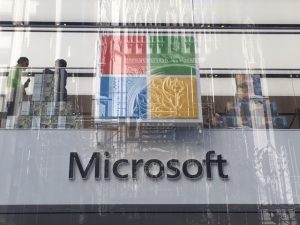Why Lawyers Should Care About These Weird Computers Coming Out
We are in the middle of a huge work culture change, and it’s being driven in part by these new things coming out.
 So, today Microsoft is having its conference in Shanghai to announce new Surface computers. What does that mean for lawyers though, whose Outlook calendars and pleading templates work just as well on a fourth-generation Intel i5 than on a seventh-generation i7? Does it really matter what the new computers are and how fast they can do things?
So, today Microsoft is having its conference in Shanghai to announce new Surface computers. What does that mean for lawyers though, whose Outlook calendars and pleading templates work just as well on a fourth-generation Intel i5 than on a seventh-generation i7? Does it really matter what the new computers are and how fast they can do things?
The answer is yes, but not because we need faster, better computers. It’s because between the hardware changes that are coming and the software changes, manufacturers are rapidly trying to change work culture to encourage mobility and remote working. We are right in the middle of a huge work culture change, which includes law practices, and it’s being driven in part by these new things coming out.
What Is Happening?

Is The Future Of Law Distributed? Lessons From The Tech Adoption Curve
First off, I jumped on the Microsoft computer bandwagon when the Surface Pro 3 came out, and since then, I buy only Surface computers for work. I could take notes with paper, but as a solo attorney, it is critical for me to stay organized. I need to be able to have access to all of my notes all the time, so I take notes digitally with my Surface Pro with the digital pen. The Surface Pro is like an iPad in that it is light and portable and I can use it as a tablet. It’s more like having a desktop computer that runs a full version of all of my programs and can store all of my files, but in the form of an iPad. So, it’s like an iPad, but good.
Since then, Microsoft has announced the Surface Book, a more powerful version of the Surface Pro – a laptop with a detachable screen that can be used as a tablet. They announced the Surface Studio, a large all-in-one computer that you can transform into a touchscreen drafting table. A few weeks ago, Microsoft announced the Surface laptop, which runs on a watered-down version of Windows, designed for students on the go. Today, the newest Surface computer gets announced.
So, What’s the Big Deal?
All of these hardware updates are not a big deal per se. We anticipate that computers will get lighter and faster and more capable over time. The big deal is when you look at why they are coming out with these new computers and what plans they have in the near future.
Sponsored

Early Adopters Of Legal AI Gaining Competitive Edge In Marketplace

Legal AI: 3 Steps Law Firms Should Take Now

The Business Case For AI At Your Law Firm


Navigating Financial Success by Avoiding Common Pitfalls and Maximizing Firm Performance
A few weeks ago at the Build 2017 conference, Microsoft announced new software capabilities that they are planning for later this year. For years now, Microsoft has been acquiring companies and integrating them with Office 365 and Windows 10 to let you do more from places other than your desk. For example, the new Timeline feature takes advantage of the artificial intelligence working in the background of Windows, and lets you start a document at work, and when you pick up your cell phone or go to another computer it will ask you if you want to pick up where you left off, regardless of whether that file is on your computer. If it’s not on your computer, it downloads it and you can get to work seamlessly. Here’s a portion of the demo:
Microsoft also announced huge upgrades to OneDrive, its cloud storage app to easier manage taking your files with you on the go.
They are making software that is making it easier to work on the go, and hardware that lets us pack up our entire desktop and fit it under our arm, and work from home or at the beach.
The Death of the Desktop
Sponsored

Navigating Financial Success by Avoiding Common Pitfalls and Maximizing Firm Performance

Is The Future Of Law Distributed? Lessons From The Tech Adoption Curve
It is my prediction that desktop computers in the office will be gone in five years. As we’ve seen in big law firms, more law firms will rely on employees working from home. That will be hastened by the technology that is allowing that transition to happen more smoothly.
Jeff Bennion is a solo practitioner at the Law Office of Jeff Bennion. He serves as a member of the Board of Directors of San Diego’s plaintiffs’ trial lawyers association, Consumer Attorneys of San Diego. He is also the Education Chair and Executive Committee member of the State Bar of California’s Law Practice Management and Technology section. He is a member of the Advisory Council and instructor at UCSD’s Litigation Technology Management program. His opinions are his own. Follow him on Twitter here or on Facebook here, or contact him by email at jeff@trial.technology.








